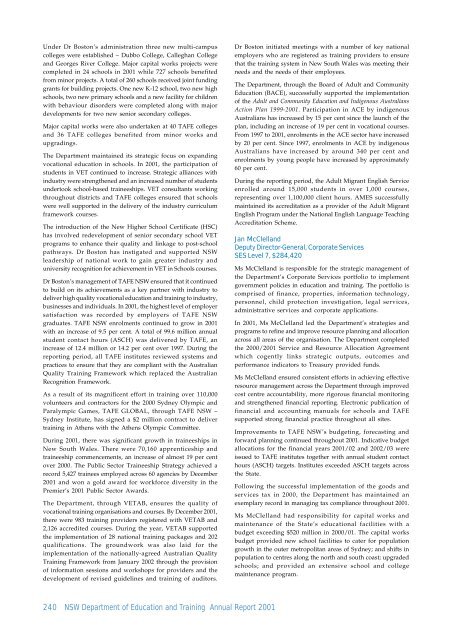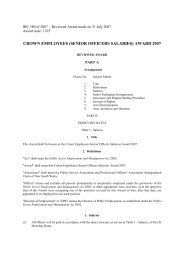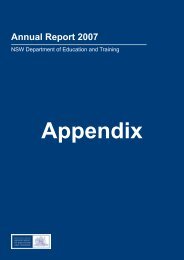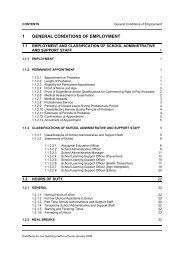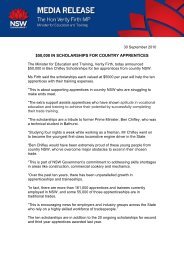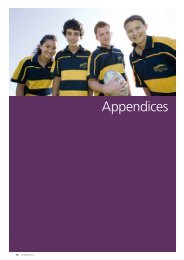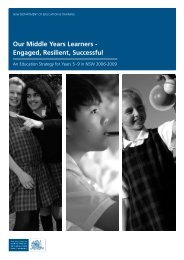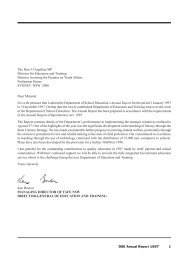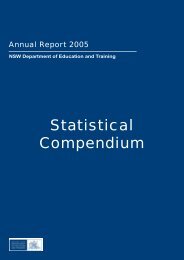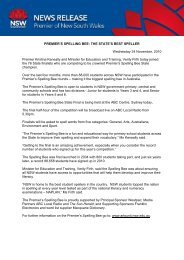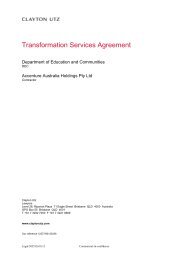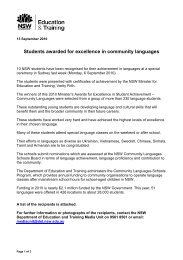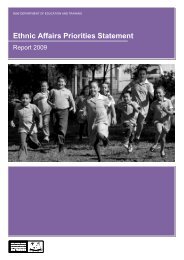APPENDICES - Department of Education and Communities - NSW ...
APPENDICES - Department of Education and Communities - NSW ...
APPENDICES - Department of Education and Communities - NSW ...
Create successful ePaper yourself
Turn your PDF publications into a flip-book with our unique Google optimized e-Paper software.
Under Dr Boston’s administration three new multi-campuscolleges were established – Dubbo College, Calleghan College<strong>and</strong> Georges River College. Major capital works projects werecompleted in 24 schools in 2001 while 727 schools benefitedfrom minor projects. A total <strong>of</strong> 260 schools received joint fundinggrants for building projects. One new K-12 school, two new highschools, two new primary schools <strong>and</strong> a new facility for childrenwith behaviour disorders were completed along with majordevelopments for two new senior secondary colleges.Major capital works were also undertaken at 40 TAFE colleges<strong>and</strong> 36 TAFE colleges benefited from minor works <strong>and</strong>upgradings.The <strong>Department</strong> maintained its strategic focus on exp<strong>and</strong>ingvocational education in schools. In 2001, the participation <strong>of</strong>students in VET continued to increase. Strategic alliances withindustry were strengthened <strong>and</strong> an increased number <strong>of</strong> studentsundertook school-based traineeships. VET consultants workingthroughout districts <strong>and</strong> TAFE colleges ensured that schoolswere well supported in the delivery <strong>of</strong> the industry curriculumframework courses.The introduction <strong>of</strong> the New Higher School Certificate (HSC)has involved redevelopment <strong>of</strong> senior secondary school VETprograms to enhance their quality <strong>and</strong> linkage to post-schoolpathways. Dr Boston has instigated <strong>and</strong> supported <strong>NSW</strong>leadership <strong>of</strong> national work to gain greater industry <strong>and</strong>university recognition for achievement in VET in Schools courses.Dr Boston’s management <strong>of</strong> TAFE <strong>NSW</strong> ensured that it continuedto build on its achievements as a key partner with industry todeliver high quality vocational education <strong>and</strong> training to industry,businesses <strong>and</strong> individuals. In 2001, the highest level <strong>of</strong> employersatisfaction was recorded by employers <strong>of</strong> TAFE <strong>NSW</strong>graduates. TAFE <strong>NSW</strong> enrolments continued to grow in 2001with an increase <strong>of</strong> 9.5 per cent. A total <strong>of</strong> 99.6 million annualstudent contact hours (ASCH) was delivered by TAFE, anincrease <strong>of</strong> 12.4 million or 14.2 per cent over 1997. During thereporting period, all TAFE institutes reviewed systems <strong>and</strong>practices to ensure that they are compliant with the AustralianQuality Training Framework which replaced the AustralianRecognition Framework.As a result <strong>of</strong> its magnificent effort in training over 110,000volunteers <strong>and</strong> contractors for the 2000 Sydney Olympic <strong>and</strong>Paralympic Games, TAFE GLOBAL, through TAFE <strong>NSW</strong> –Sydney Institute, has signed a $2 million contract to delivertraining in Athens with the Athens Olympic Committee.During 2001, there was significant growth in traineeships inNew South Wales. There were 70,160 apprenticeship <strong>and</strong>traineeship commencements, an increase <strong>of</strong> almost 19 per centover 2000. The Public Sector Traineeship Strategy achieved arecord 5,427 trainees employed across 60 agencies by December2001 <strong>and</strong> won a gold award for workforce diversity in thePremier’s 2001 Public Sector Awards.The <strong>Department</strong>, through VETAB, ensures the quality <strong>of</strong>vocational training organisations <strong>and</strong> courses. By December 2001,there were 983 training providers registered with VETAB <strong>and</strong>2,126 accredited courses. During the year, VETAB supportedthe implementation <strong>of</strong> 28 national training packages <strong>and</strong> 202qualifications. The groundwork was also laid for theimplementation <strong>of</strong> the nationally-agreed Australian QualityTraining Framework from January 2002 through the provision<strong>of</strong> information sessions <strong>and</strong> workshops for providers <strong>and</strong> thedevelopment <strong>of</strong> revised guidelines <strong>and</strong> training <strong>of</strong> auditors.Dr Boston initiated meetings with a number <strong>of</strong> key nationalemployers who are registered as training providers to ensurethat the training system in New South Wales was meeting theirneeds <strong>and</strong> the needs <strong>of</strong> their employees.The <strong>Department</strong>, through the Board <strong>of</strong> Adult <strong>and</strong> Community<strong>Education</strong> (BACE), successfully supported the implementation<strong>of</strong> the Adult <strong>and</strong> Community <strong>Education</strong> <strong>and</strong> Indigenous AustraliansAction Plan 1999-2001. Participation in ACE by indigenousAustralians has increased by 15 per cent since the launch <strong>of</strong> theplan, including an increase <strong>of</strong> 19 per cent in vocational courses.From 1997 to 2001, enrolments in the ACE sector have increasedby 20 per cent. Since 1997, enrolments in ACE by indigenousAustralians have increased by around 340 per cent <strong>and</strong>enrolments by young people have increased by approximately60 per cent.During the reporting period, the Adult Migrant English Serviceenrolled around 15,000 students in over 1,000 courses,representing over 1,100,000 client hours. AMES successfullymaintained its accreditation as a provider <strong>of</strong> the Adult MigrantEnglish Program under the National English Language TeachingAccreditation Scheme.Jan McClell<strong>and</strong>Deputy Director-General, Corporate ServicesSES Level 7, $284,420Ms McClell<strong>and</strong> is responsible for the strategic management <strong>of</strong>the <strong>Department</strong>’s Corporate Services portfolio to implementgovernment policies in education <strong>and</strong> training. The portfolio iscomprised <strong>of</strong> finance, properties, information technology,personnel, child protection investigation, legal services,administrative services <strong>and</strong> corporate applications.In 2001, Ms McClell<strong>and</strong> led the <strong>Department</strong>’s strategies <strong>and</strong>programs to refine <strong>and</strong> improve resource planning <strong>and</strong> allocationacross all areas <strong>of</strong> the organisation. The <strong>Department</strong> completedthe 2000/2001 Service <strong>and</strong> Resource Allocation Agreementwhich cogently links strategic outputs, outcomes <strong>and</strong>performance indicators to Treasury provided funds.Ms McClell<strong>and</strong> ensured consistent efforts in achieving effectiveresource management across the <strong>Department</strong> through improvedcost centre accountability, more rigorous financial monitoring<strong>and</strong> strengthened financial reporting. Electronic publication <strong>of</strong>financial <strong>and</strong> accounting manuals for schools <strong>and</strong> TAFEsupported strong financial practice throughout all sites.Improvements to TAFE <strong>NSW</strong>’s budgeting, forecasting <strong>and</strong>forward planning continued throughout 2001. Indicative budgetallocations for the financial years 2001/02 <strong>and</strong> 2002/03 wereissued to TAFE institutes together with annual student contacthours (ASCH) targets. Institutes exceeded ASCH targets acrossthe State.Following the successful implementation <strong>of</strong> the goods <strong>and</strong>services tax in 2000, the <strong>Department</strong> has maintained anexemplary record in managing tax compliance throughout 2001.Ms McClell<strong>and</strong> had responsibility for capital works <strong>and</strong>maintenance <strong>of</strong> the State’s educational facilities with abudget exceeding $520 million in 2000/01. The capital worksbudget provided new school facilities to cater for populationgrowth in the outer metropolitan areas <strong>of</strong> Sydney; <strong>and</strong> shifts inpopulation to centres along the north <strong>and</strong> south coast; upgradedschools; <strong>and</strong> provided an extensive school <strong>and</strong> collegemaintenance program.240 <strong>NSW</strong> <strong>Department</strong> <strong>of</strong> <strong>Education</strong> <strong>and</strong> Training Annual Report 2001


